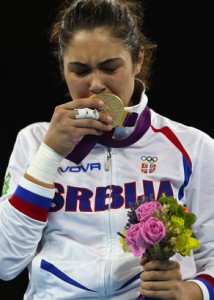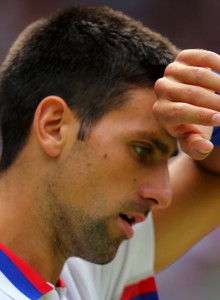The Party’s Over, Let The Hard Work Begin
 The London 2012 Olympic Games were a triumph. Nobody can dispute that London rose to the tremendous challenge and hosted a Games that was enjoyed as much by athletes in the Olympic Village as it was valued by the many millions who watched on screen. Memories that will endure beyond a generation were forged in the passion and determination displayed on track, field and pool.
The London 2012 Olympic Games were a triumph. Nobody can dispute that London rose to the tremendous challenge and hosted a Games that was enjoyed as much by athletes in the Olympic Village as it was valued by the many millions who watched on screen. Memories that will endure beyond a generation were forged in the passion and determination displayed on track, field and pool.
All good things must end and, after more than two weeks of inspirational performances and countless displays of sporting excellence, the spectacular Olympic party is over. The decorations are coming down, the athletes have all gone home, and the big clean up has already started. Even the Olympic venues have been transformed to await the start of the Paralympic Games, next week, when even more new heroes will be made.
A Country Expects
Almost as soon as the athletes arrive home to warm welcomes, many of them proudly displaying their medals, talk turns to how well the teams performed against their pre-Games medal targets. Every performance will be analysed and argued over by trainers, media and armchair pundits: who surprised fans by pulling a medal winning performance out of the bag, who achieved a personal best but just could not beat the competition, and who failed to live up to the expectations of their team and country.
Team Serbia was clear in its publicly stated objectives of five-ten medals at London 2012. It won four, none of which only one was gold. No medal should be undervalued and the one silver and two bronze medals were hard won, but that does not negate the belief of many that some of Serbia’s biggest names underperformed. Serbia came 42 out of 85 countries, an improvement on its Beijing ranking, but without the anticipated medal count. Neighbouring Croatia (25th) performed especially well, winning three gold medals (including water polo).
On the eve of Serbia’s first bronze, President Tomislav Nikolic told Wild Rooster that he expected ten medals. “This victory will be the first of ten, maybe,’ he said. It is not know what he thought when he greeted the slightly smaller than expected medal winning team at Belgrade Airport, on Tuesday.
Seven Medals For Serbia
As the Games got under way in London, Serbian Olympic Committee boss Vlade Divac and Chef de Mission Bransilav Jevtić each restated their expectations of more than five. Jevtić was confident of seven, he said. This was not just bravado or a case of talking-up their prospects. These targets should have been within reach of Team Serbia, but on too many occasions their athletes were outclassed. Too many of Serbia’s big sporting names returned to the Village empty handed.
 National flag-bearer Novak Djoković is a disappointing case in point. Only days before the first match, Team Serbia’s leadership spoke as if a gold was guaranteed in tennis. But Nole’s performances on the Wimbledon grass were not worthy of a champion. He looked distracted and Team Serbia had to settle for no medals from the court. Then there was Milorad Čavić, a swimmer who performed so well in Beijing and who was, on the eve of his first swim at London 2012, proclaimed to be in the form of his life. But he did not appear relaxed, neither in the Olympic Village nor in the pool, and he slipped beyond the medal hopes. Nadja Higl also failed to achieve what had been hoped for her.
National flag-bearer Novak Djoković is a disappointing case in point. Only days before the first match, Team Serbia’s leadership spoke as if a gold was guaranteed in tennis. But Nole’s performances on the Wimbledon grass were not worthy of a champion. He looked distracted and Team Serbia had to settle for no medals from the court. Then there was Milorad Čavić, a swimmer who performed so well in Beijing and who was, on the eve of his first swim at London 2012, proclaimed to be in the form of his life. But he did not appear relaxed, neither in the Olympic Village nor in the pool, and he slipped beyond the medal hopes. Nadja Higl also failed to achieve what had been hoped for her.
Harsh but fair comments within Serbian media have forced Team Serbia bosses to defend their athletes, even while having to admit that the team did not reach the standards to be expected of it. Returning to Serbia, Divac said: ”I know we could have done more, but essentially I am satisfied.”
Even Serbia’s water polo captain and coach called for calm during the Games, fearing that the negative press interest was distracting the players from their widely anticipated gold medal. Maybe that was right: the tournament favourites fought hard to win bronze (Croatia took gold).
Lack of Funding
Talk in Serbia is about what went so wrong. Of course, there are the usual bizarre conspiracy theories, which make for amusing reading. But more educated talk is about an ongoing lack of funding, pampering to inflated egos and under estimating the international competition as possible root causes. There was also even talk that some of Serbia’s athletes might be enjoying their downtime more than should be expected, adding to the chatter about possible reasons behind the team’s rather lacklustre performance.
From the start of the Games, the athletes were in two camps. While the younger, fresher athletes with less attention heaped on them were full of spirit and hope, others were already complaining that their schedule and how the location of sporting venues meant that they could not all live in the Olympic Village. Some senior athletes even appeared wholly underwhelmed by the whole experience.
When Will Serbia Learn?
Serbian journalist Ranko Trifković summed up the thoughts of many people: “The Olympic games are the highest honour for a professional athlete. Serbia is not providing for our athletes, and then expects them to win medals? Seriously, when will Serbia learn that we are a small and insignificant country with big and significant people scattered to all four winds?
Ranko drew unfortunate comparisons to one of Serbia’s neighbouring countries, who came ninth in the medal rankings: “Look at Hungary, they won a shitload of medals, because they care about every sport, not just a few ‘big national disciplines’. I quote Hungary not only because they are an example of a poor country that really roots for its athletes, but because many Serbian girls compete for them (also in The Games), simply because they wanted to do their job (which they could not in Serbia).”
For now, let us celebrate all medal winners for their incredible achievements at London 2012. Milica Mandić (gold: taekwondo), Ivana Maksimović (silver: shooting), Andrija Zlatić (bronze: shooting) and Serbia’s water polo team all deserve praise, support and celebration. Then thoughts should turn to better investment in more sports. That is how to encourage young athletes, improve performance and bring home the medals. This is where the hard work really begins, if a lasting sporting legacy is to be seen in our communities.


No comments yet.
Be first to leave your comment!